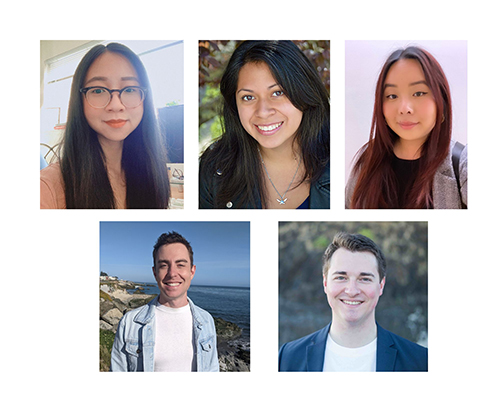Five UC Santa Cruz doctoral candidates in Baskin Engineering were awarded a fellowship that covered nearly one-third of their tuition and fees in the 2022-2023 academic year—giving them the opportunity to focus on the next steps in their educational and professional trajectories.
The Koerner Family Foundation’s current cohort of fellows—five of whom are from UC Santa Cruz—were each awarded a $12,000 grant. The UCSC awardees are:
- Samantha Conde, Computational Media — researching Acculturative Game Design with Latine Communities
- W. Zachary Horton, Statistics — researching Flexible Mixture Modeling Approaches to Renewal Processes
- Eric Malekos, Biomolecular Engineering — researching Characterization of novel peptides in inflammation and immunity
- Remy Nguyen, Biomolecular Engineering — researching Reliable Computational Approaches for Identity Analysis from Low-Coverage Sequencing Data
- Tiffany Thang, Computational Media — researching Serious VR Games for the Social-emotional Support of People with Disabilities and Special Needs
The foundation, which began its efforts in 2001, aims to inspire future generations of research-oriented engineers, encouraging students to both earn their doctoral degrees in engineering and then stay in the industry in the United States.
Mike Koerner, president of the Koerner Family Foundation, explained that his family is a family of engineers, going back to his late father’s legacy as a civil engineering professor at Drexel University. When his parents passed, they endowed their savings to the Koerner Family Fellowship, perpetuating their legacy and strong belief in supporting American students through the financial woes of higher education.
“With so many alternate opportunities, I’m grateful that these Americans continue their academic pursuit to get engineering Ph.D.s…what can we do with this endowment to support that cause?” Koerner asked.
With that understanding, Koerner and his family decided to launch this fellowship. They began their partnership with UC Santa Cruz in 2020. In the time since, the Koerner Family Foundation has supported six students at UCSC.
The main requirements for these grants are the student has completed their candidacy exams, they are actively doing research toward a Ph.D., and they are U.S. citizens.
Zach Horton, a fourth-year doctoral candidate in the Statistics department, said that the limited requirements for the fellowship application were in itself all the more reason to apply. With the $12,000 award, Horton is able to take time off from his additional jobs outside of his graduate studies to spend time with his wife and two children and work on his research.
“I was floored to find out that I had received this,” he said. “The practical benefits you get from this award, that’s huge.”
In calculating the impact of the award, Horton estimates that it adds a two or two-and-a-half increase to the buffer of usable money his family has after paying rent: “It’s very impactful and meaningful…it frees up between 10 to 15 hours per week.”
Samantha Conde, a third-year doctoral candidate in the Computational Media department, also completed her undergraduate work at UC Santa Cruz, and has seen the cost of living in Santa Cruz increase over the last seven years. Although she acknowledged her luck in finding places to live because of her longevity in town, she’s also seen rent and the relative cost of living continue to rise—which makes an award like the Koerner Family Fellowship even more impactful.
“It felt like it was too good to be true…it was just such an amazing surprise that came across my email,” she said.
Additionally, because of her research specificity, Conde has had a great deal of difficulty in finding grants, scholarships, and fellowships in the past. With this fellowship, Conde felt that it helped to make “everything else fall into place.”
“It lifted so much weight off my shoulders, and it made me proud to see my work is validated,” she said. “I was very honored and happy to be accepted as a fellow.”
The main goal for this fellowship is to help these soon-to-be engineers to get over the finish line.
“A $12,000 award can be that needed push to help a student as they complete coursework, research, writing and even begin their job search—but it could also be used for something not pertaining to their degree, like car payments or an engagement ring,” Koerner says.
“I think it can be really trying on a lot of these students to push through [the completion of their Ph.D.],” he said. “That’s where we would like to insert some money and some encouragement and support…they can figure it out for themselves, how to take care of their lives.”
With these awards, Koerner said, the students “really open up the next generation of American industry and innovation.”



